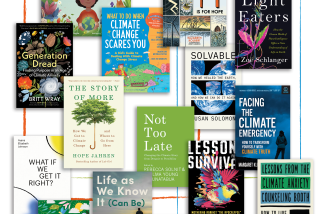Review: Nicholas D. Kristof & Sheryl WuDunn show nation on a ‘Tightrope’
- Share via
On weekday mornings in the 1970s, Nicholas Kristof remembers leaving his family’s Oregon farm to join classmates aboard the Number 6 bus headed for Yamhill Grade School.
Yamhill is a tiny town between Portland and the Pacific where Kristof’s parents raised sheep and cherries in addition to being professors at Portland State University. Their house was filled with books, reading was a family pastime and life in general was pretty rosy.
Kristof did well in school and grew up to be an author and columnist for the New York Times. Now he and his wife, former Times foreign correspondent Sheryl WuDunn, have written an unsettling book — “Tightrope, Americans Reaching for Hope.” It begins by looking back at Kristof’s school bus pals. They have not fared well.
About a fourth of the kids who rode on the Number 6 bus are dead.
“A boy named Mike is dead from suicide, after struggles with drugs; Steve from the aftermath of a foolhardy motorcycle accident; Cindy from depression, obesity and then a heart attack,” the authors write. And so on for Jeff, Tim, Billy, Kevin and Sue. Others are alive but are mired in addictions. One is in prison “for offenses so harrowing that the family has cut him off.”
Kristof and WuDunn — the first husband and wife team to win a Pulitzer Prize, for their coverage of China — wrote the 2009 bestseller “Half the Sky,” revealing a worldwide oppression of women. “Tightrope” now aims at the “brittleness of life” befalling about 150 million Americans, from Yamhill to Baltimore.
Along with a series of personal stories, Kristof and WuDunn provide a whirl of statistics suggesting that cycles of poverty, drug abuse, unemployment and — in the case of children — parental deprivation resulting from shattered families have left not quite half of our nation adrift and seemingly destined to stay that way.
These tragedies are too stark to overlook any longer. For example:
- 70,000 Americans die annually from drug use, another 88,000 from alcohol abuse and 47,000 from suicide. More die from these three causes every two weeks than died in 18 years of war in Afghanistan and Iraq, they report.
- One in seven Americans lives below the poverty line; suicide rates are at a 30-year high; opioids and other drugs kill more each month than guns and car crashes; every seven minutes someone dies from an overdose; one child in eight lives with a drug-abusing parent.
Indeed, some of the Yamhill kids made “terrible, self-destructive choices” about drug use or dropping out of school, the authors note. But the authors contend their missteps were compounded by choices that their country made by way of “decades of social policy mistakes” and the disappearance of blue-collar jobs that once supported Kristoff’s hometown and many other communities across the country.
“One of the most infuriating elements of American myopia about investing in at-risk kids,” the authors write, “is that politicians often insist that they don’t have the funds to pay for social services — but they somehow find the resources to pay for prisons later on.”
America as a nation, they contend, “is guilty of child neglect. We have punished children mainly because they don’t vote.”
The national political climate offers little help. “A harshness and at times a nastiness have crept into American policy, rooted in the misconception that those who struggle with unemployment, finances, drugs and life’s messiness are fundamentally weak, in danger of dependency, in need of hard lessons.”
That shift became evident with the election of Ronald Reagan in 1980, they write. Hostility toward the government began to rise as union protections began to fall. They wonder if the nation’s fears about race and violence have also played a part, beginning in the 1960s when riots broke out from Chicago to Los Angeles. Richard Nixon “seized upon” those fears in 1968. “Welfare was portrayed as handouts to lazy blacks and immigration as a threat to American culture and jobs.”
They also cite America’s war on drugs, which led to mass incarcerations. In the two decades since, drug fatalities have soared: from 6,100 deaths in 1980 to 70,000 in 2018.
Portugal, by contrast, took a different approach “that proved a huge success.” Instead of criminalizing drug abuse, it focused on treatment and prevention. The number of people with addictions in that county has fallen about two-thirds, and its rate of drug-related deaths is the lowest in Western Europe. “In Portugal, 6 persons die of drug-related causes per million between the ages of 15 and 64. In the United States, the figure is 348,” Kristof and WuDunn write.
“Tightrope” suggests there is at least a little hope on the horizon. Local government policies are shifting as the opioid crisis moves into middle-class white communities, and they mention organizations and aid workers who are turning damaged lives around.
They tell the story of Diane Reynolds, who grew up in a broken home, had been sexually abused as a child and, at 15, married an older man who beat her. She remarried and became an ordained minister, determined to save others from the suffering she had endured. She started offering food to the needy out of a rented basement and turned it into the nonprofit Providing Hope. Today it has 37 employees and serves 7,800 people each year in and around Yamhill County.
Yet when I got to the story of Kristof classmate Mary Mayor, I was left discouraged that any collection of facts and statistics will make a difference.
Mayor was smart and hardworking, but after high school got “swamped by the wave of joblessness, despair and drugs,” the authors write. She spent seven years homeless, once putting a gun in her mouth to end it all. Her sister and three other relatives had already killed themselves.
A church group saved her. She now crafts and sells birdhouses. The authors asked if Mayor, given her wrenching experience, supported politicians “who would take a different course to fix America.”
She said yes, although she said she had never voted until 2016, when she cast her ballot for Donald Trump, whose administration has weakened healthcare provided by the Affordable Care Act and cut money for disability benefits, housing and nutrition assistance to low-income working families.
“He believes in the American people,” Mayor said. “I feel great to call myself an American once again.”
Tightrope: Americans Reaching for Hope
Nicholas D. Kristof and Sheryl WuDunn
Knopf: 320 pages. $27.95
Nottingham is a Southern California writer and former Times editor.
More to Read
Sign up for our Book Club newsletter
Get the latest news, events and more from the Los Angeles Times Book Club, and help us get L.A. reading and talking.
You may occasionally receive promotional content from the Los Angeles Times.






